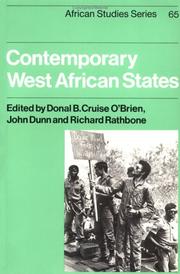| Listing 1 - 4 of 4 |
Sort by
|
Book
Year: 1997 Publisher: Washington, D.C. Brookings Institution Press
Abstract | Keywords | Export | Availability | Bookmark
 Loading...
Loading...Choose an application
- Reference Manager
- EndNote
- RefWorks (Direct export to RefWorks)
Multi
ISSN: 19579519 ISBN: 9782811126247 2811126244 Year: 2019 Publisher: Paris: Karthala,
Abstract | Keywords | Export | Availability | Bookmark
 Loading...
Loading...Choose an application
- Reference Manager
- EndNote
- RefWorks (Direct export to RefWorks)
"Les classes politiques africaines ont choisi, au lendemain des indépendances, de reproduire le cadre territorial hérité de la colonisation et ont entériné le principe de l’État-nation. Ce dernier contredit la plupart des ressorts politiques, économiques, culturels des sociétés africaines. Mais il a aussi fait l’objet de processus d’appropriation souvent massive, et toujours créative, de la part de l’ensemble de leurs acteurs. Cette double réalité rend insuffisantes la plupart des interprétations qui mettent l’accent sur des contradictions supposées insurmontables entre un État hérité de la colonisation et les sociétés du cru, sous la forme d’un jeu à somme nulle. Les choses sont en fait plus compliquées. Car les régimes de légitimité, de sécurité, de responsabilité sociale, d’enrichissement, de représentation culturelle et politique du « bon gouvernement » participent simultanément de ces deux dimensions historiques, d’espaces différents, de durées disparates qui s’encastrent les unes dans les autres plutôt qu’elles ne se succèdent. Cette distorsion inhérente aux sociétés africaines contemporaines est source d’ambivalence, plutôt que d’ambiguïté comme le pensaient Cheikh Hamidou Kane et Georges Balandier. Elle rend problématique l’institutionnalisation d’une gouvernance de la transparence, et tend à inscrire la compétition politique, l’accumulation de la richesse et la lutte sociale dans l’ordre de la violence."
Nation-state --- Legitimacy of governments --- Africa, West --- Politics and government --- History. --- History --- Africa, West - Politics and government - 1960 --- -Africa, West - History

ISBN: 0521368936 0521363667 0511521618 0511875169 9780521368933 9780511521614 9780521363662 Year: 1989 Volume: 65 Publisher: Cambridge: Cambridge university press,
Abstract | Keywords | Export | Availability | Bookmark
 Loading...
Loading...Choose an application
- Reference Manager
- EndNote
- RefWorks (Direct export to RefWorks)
The West African states have reached maturity. This new volume - appearing a decade after the successful West African States: Failure and Promise - provides up-to-date studies of nine states, including Chad, Burkina Faso and Cameroon, which were neglected in the earlier volume, and introduces contemporary theories of West African politics. The book reflects changes on the ground and also in academic debate, notably the remarkable retreat of dependency theory and Marxian analysis and the rise of free-market theorising by both governments and scholars. The volume also contains important observations on the political importance of religious fundamentalism in the region, and the growth of sub-national forms of political activity. The writers are well-known scholars in the field, and include contributors to the influential journal Politique Africaine. This will be a useful textbook for everyone interested in African politics, but it is also a provocative contribution to the debate on the nature of the state and political processes in Africa.
Political systems --- West Africa --- Africa, West --- Afrique occidentale --- Politics and government --- Politique et gouvernement --- 321 <6> --- #SBIB:328H41 --- Politieke organisatie. Staten als politieke machten. Regeringsvormen--Afrika --- Instellingen en beleid: Afrika: comparatief / diverse landen --- 321 <6> Politieke organisatie. Staten als politieke machten. Regeringsvormen--Afrika --- Social Sciences --- Political Science --- Africa, West - Politics and government - 1960 --- -Africa, West --- -Africa, West - Politics and government - 1960 --- -#SBIB:328H41
Book
ISBN: 2841462544 9782841462544 Year: 1995 Publisher: Paris: Syros,
Abstract | Keywords | Export | Availability | Bookmark
 Loading...
Loading...Choose an application
- Reference Manager
- EndNote
- RefWorks (Direct export to RefWorks)
Africa, West --- Politics and government --- Rural conditions --- 841.1 Democratisering --- 841.3 Politieke bewegingen --- 881.2 Centraal-Afrika --- 881.5 West-Afrika --- Africa, Western --- West Africa --- Western Africa --- Rural conditions. --- Africa, West - Politics and government - 1960 --- -Africa, West - Rural conditions
| Listing 1 - 4 of 4 |
Sort by
|

 Search
Search Feedback
Feedback About UniCat
About UniCat  Help
Help News
News